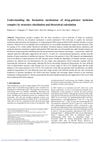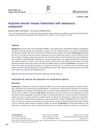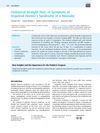 77 citations,
July 2007 in “Dermatologic Therapy”
77 citations,
July 2007 in “Dermatologic Therapy” Methotrexate is a key, cost-effective drug for skin conditions, but requires careful monitoring for side effects.
 131 citations,
October 2004 in “Clinical Cancer Research”
131 citations,
October 2004 in “Clinical Cancer Research” Tempol is safe and may prevent hair loss from brain radiotherapy.
 79 citations,
January 1982 in “The American Journal of Medicine”
79 citations,
January 1982 in “The American Journal of Medicine” Etoposide is effective in treating several cancers, especially small cell lung cancer, with acceptable side effects.
 January 2023 in “Brazilian Journals Editora eBooks”
January 2023 in “Brazilian Journals Editora eBooks” Girls with Autism Spectrum Disorder may show different symptoms than boys, leading to missed or delayed diagnoses.
 March 1998 in “Journal of Dermatological Science”
March 1998 in “Journal of Dermatological Science” Combining RU58841 and minoxidil significantly increases hair growth.

The research found how certain drugs and polymers form stable complexes, which could help develop new pharmaceutical forms.
 December 2024 in “International Journal of Drug Delivery Technology”
December 2024 in “International Journal of Drug Delivery Technology” The new delivery method for dutasteride is more effective and has fewer side effects.
 43 citations,
July 2013 in “Pharmacological reviews”
43 citations,
July 2013 in “Pharmacological reviews” New research on prostamide F2α has led to treatments for glaucoma and eyelash growth and may have more medical uses.
 27 citations,
April 2013 in “Reviews in endocrine and metabolic disorders”
27 citations,
April 2013 in “Reviews in endocrine and metabolic disorders” The document concludes that using LC-MS/MS for measuring androgens is more accurate than older methods, but it needs careful validation and standardized references to be most effective.
3 citations,
January 2019 in “Case Reports in Ophthalmology” VKHD and sarcoidosis may share a common cause.
 12 citations,
April 2018 in “Revista Brasileira de Ginecologia e Obstetrícia”
12 citations,
April 2018 in “Revista Brasileira de Ginecologia e Obstetrícia” Women with Systemic Lupus Erythematosus should have closely monitored pregnancies and avoid certain medications to improve their pregnancy outcomes.
 January 2017 in “Archives of Aesthetic Plastic Surgery”
January 2017 in “Archives of Aesthetic Plastic Surgery” Hair care products with placental growth factor can improve hair thickness and density in postpartum hair loss.
 2 citations,
January 2000 in “Elsevier eBooks”
2 citations,
January 2000 in “Elsevier eBooks” The document explains how hair is studied in forensics to identify its source and its role in criminal investigations.
 87 citations,
July 2018 in “Biochimica et Biophysica Acta (BBA) - Molecular Cell Research”
87 citations,
July 2018 in “Biochimica et Biophysica Acta (BBA) - Molecular Cell Research” Mice studies show that Protein Phosphatase 2A is crucial for cell growth, development, and disease prevention.
 130 citations,
September 2018 in “Cell Reports”
130 citations,
September 2018 in “Cell Reports” Macrophages help heal nerves by aiding the maturation of Schwann cells and are important for nerve repair.
 October 2022 in “Boletín médico del Hospital infantil de México/Boletín médico del Hospital Infantil de México”
October 2022 in “Boletín médico del Hospital infantil de México/Boletín médico del Hospital Infantil de México” The patient has a rare skin condition that shows features of two known disorders.
73 citations,
November 2001 in “Journal of Investigative Dermatology Symposium Proceedings” Markers help differentiate between apocrine and eccrine sweat glands to identify sweat gland tumors.
 129 citations,
May 2015 in “Cell Stem Cell”
129 citations,
May 2015 in “Cell Stem Cell” Different types of stem cells exist within individual skin layers, and they can adapt to damage, transplantation, or tumor growth. These cells are regulated by their environment and genetic factors. Tumor growth is driven by expanding, genetically altered cells, not long-lived mutant stem cells. There's evidence of cancer stem cells in skin tumors. Other cells, bacteria, and genetic factors help maintain balance and contribute to disease progression. A method for growing mini organs from single cells has been developed.
 2 citations,
January 2018 in “European journal of pediatric surgery reports”
2 citations,
January 2018 in “European journal of pediatric surgery reports” A baby girl's hair turned straight on one side due to a neck tumor and surgery, but it returned to curly as she recovered.
 13 citations,
January 2015 in “Molecular Pharmaceutics”
13 citations,
January 2015 in “Molecular Pharmaceutics” Minoxidil works well as a high permeability reference drug for biopharmaceutics classification.
 31 citations,
January 2014 in “Journal of endocrinological investigation”
31 citations,
January 2014 in “Journal of endocrinological investigation” Woodhouse-Sakati syndrome often causes sexual development issues, hair loss, learning disabilities, deafness, muscle contractions, limb pain, and diabetes.
 125 citations,
August 2020 in “Frontiers in Immunology”
125 citations,
August 2020 in “Frontiers in Immunology” Men generally have more severe COVID-19 cases and higher death rates than women due to biological differences.
 January 2023 in “Brazilian Journals Editora eBooks”
January 2023 in “Brazilian Journals Editora eBooks” Passiflora incarnata may help with anxiety but has risks and drug interactions.
There's a genetic link between Fragile X Syndrome and Autism Spectrum Disorder.
6.7% of urine cultures showed hospital-acquired urinary tract infections.
Children used screens more during COVID-19, causing various health complaints.
Autism Spectrum Disorder is often underdiagnosed in females.
Dissociative disorders in childhood sexual abuse victims are more common in males.
Most pregnant teenagers are not dissatisfied with their body image but worry about weight.
Diagnosing tuberculosis after knee surgery is challenging due to non-specific symptoms.
Post-COVID-19 syndrome is more common in older, severely affected patients.
Psychiatrists should be part of pain management teams due to the psychological aspects of pain.
 10 citations,
March 2021 in “Skin health and disease”
10 citations,
March 2021 in “Skin health and disease” COVID-19 patients often have skin issues like chilblain-like lesions and rashes, which can help in early diagnosis and sometimes indicate severe illness.
 41 citations,
February 2001 in “Current pharmaceutical design”
41 citations,
February 2001 in “Current pharmaceutical design” Current and future treatments for alopecia areata focus on immunosuppression, immunomodulation, and protecting hair follicles.
 96 citations,
September 2021 in “International Journal of Molecular Sciences”
96 citations,
September 2021 in “International Journal of Molecular Sciences” Chitosan, a natural substance, can be used to create tiny particles that effectively deliver various types of drugs, but more work is needed to improve stability and control of drug release.

Most minoxidil products on Amazon don't provide safety or side effect information.
 January 2017 in “Springer eBooks”
January 2017 in “Springer eBooks” The document explains various skin conditions and their treatments.
 January 2021 in “Journal of cosmetology & trichology”
January 2021 in “Journal of cosmetology & trichology” Ageratum conyzoides L. extract may effectively and safely treat hair loss.
 36 citations,
November 2018 in “BMC plant biology”
36 citations,
November 2018 in “BMC plant biology” ROXY proteins help plants respond to nitrate shortage by affecting nutrient sensing and growth.




























